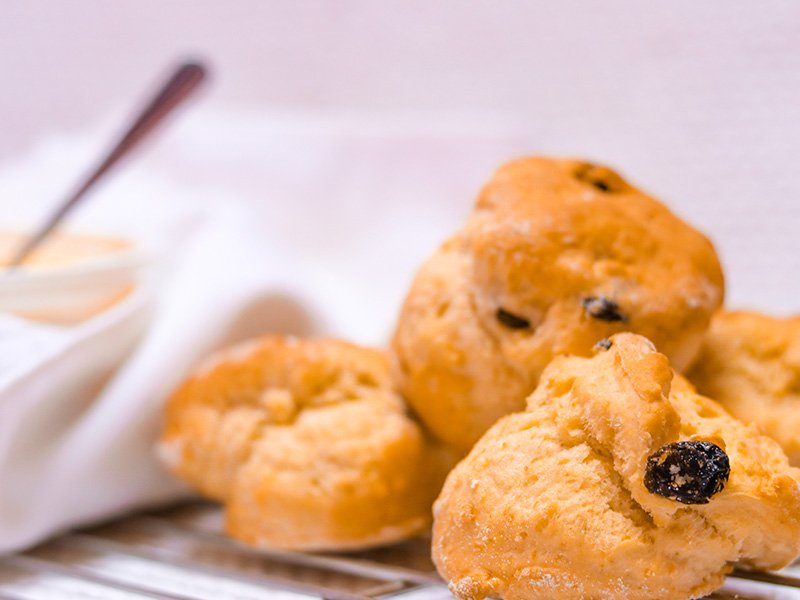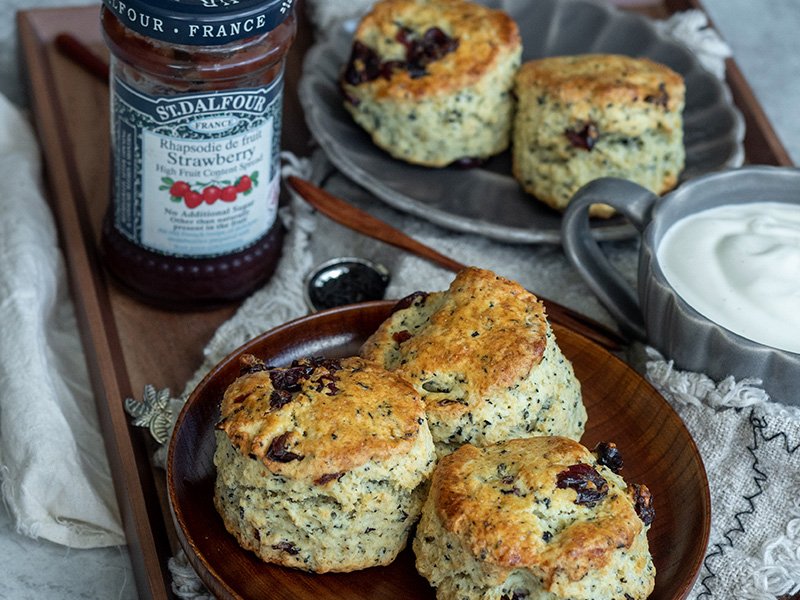Introduction to Scones and their Popularity
Indulgent, crumbly, and utterly delicious, scones have long been a beloved treat for many. Whether enjoyed alongside a steaming cup of tea or as the star of an elegant afternoon tea spread, scones hold a special place in our hearts (and stomachs!). But did you know that beyond their delectable taste, these delightful pastries also offer some surprising health benefits? That’s right! In this blog post, we’ll dive into the world of scone nutrition and uncover how these humble treats can contribute to your overall well-being. So grab a seat and get ready to discover the hidden goodness behind every buttery bite!

Basic Nutritional Profile of a Scone
Scones, cherished pastries relished for centuries, offer both delectable flavors and a fundamental nutritional profile to fuel your body. While not the healthiest menu choice, delving into their scone nutrition can guide informed decision-making.
First and foremost, scones are typically made with flour, butter or oil, sugar, eggs, and sometimes milk. This combination results in a pastry that is rich in carbohydrates and fats. Carbohydrates are our body’s main source of energy and can provide quick bursts of fuel during physical activity. Thus, in scone nutrition this combination play a vital role.
Fats play an important role in our diet as well. They supply crucial fatty acids and aid in the absorption of fat-soluble vitamins. However, it’s worth noting that scones tend to be high in saturated fats due to the use of butter or oil.
Protein content in scones is usually limited since they primarily consist of flour and sugar. However, some variations may include added ingredients such as nuts or seeds, which can boost protein levels slightly.
When it comes to vitamins and minerals found in scones, the specific amounts vary depending on the recipe used. However, common additions like fruits or nuts can contribute beneficial nutrients such as vitamin C from citrus fruits or vitamin E from almonds.
In conclusion (without using those exact words), while scones may not be considered a health food per se due to their higher calorie content and potential for excess sugar intake depending on preparation methods, enjoying them occasionally as part of a balanced diet can still bring pleasure without guilt! So go ahead and indulge responsibly!
The Role of Carbohydrates in a Scone
Carbohydrates are the main source of energy for our bodies, and they play a crucial role in scones. These delicious pastries are typically made with flour, which is rich in carbohydrates. When we consume carbohydrates, our body breaks them down into glucose, providing us with the fuel needed to power through our day.
Scones frequently include added sugars, offering a quick energy boost. Though moderation is key due to their calorie content, the carbohydrates in scone nutrition can be beneficial within a balanced diet.
In addition to providing energy, carbohydrates also contribute to the texture and taste of scones. The combination of flour and other ingredients creates that perfect crumbly yet soft consistency that we love. Whether you prefer plain scones or ones filled with fruits or chocolate chips, the carbohydrates present help create that delightful mouthfeel.
It’s important to recognize that carbohydrates vary in quality. Whole-grain flours used in some scone recipes offer more fiber than refined white flours. Fiber aids digestion and helps maintain healthy blood sugar levels.
While carbohydrates play a crucial role in the structure and flavor profile of scones, maintaining a balance in your overall carbohydrate intake with other nutrients is essential for optimal health within scone nutrition.
The Importance of Fats in a Scone
Fats often receive criticism, but they play a vital role in overall health, even in beloved scones! While scones may contain significant fat content, it’s essential to note that not all fats are created equal within scone nutrition.
In fact, the type of fat used in scones can make a big difference when it comes to their nutritional value. Saturated fats found in butter or lard are typically used to give scones their rich and indulgent texture. However, too much saturated fat can raise cholesterol levels and increase the risk of heart disease.
On the other hand, using healthier fats like olive oil or coconut oil can provide some benefits without compromising on taste. These oils contain unsaturated fats, which have been shown to help reduce inflammation and lower cholesterol levels.
Furthermore, incorporating nuts or seeds into your scone recipe adds another layer of healthy fat. These ingredients provide essential fatty acids that support brain function and promote cardiovascular health.
Balancing scone consumption is crucial given their calorie content, but opting for recipes featuring healthier fat choices can transform them into a more nutritious indulgence. Don’t hesitate to experiment with various fats when baking your next batch of these delightful pastries within Scone Nutrition!
Protein Content in Scones and its Benefits
When contemplating scones, protein isn’t typically at the forefront of our thoughts. Nevertheless, these delightful pastries do include a modest amount of protein, offering some unexpected health benefits within scone nutrition.
Protein, a vital macronutrient, plays a pivotal role in the construction and repair of tissues while also supporting diverse bodily functions. It’s especially important for muscle growth and maintenance.
While scones may not be a significant source of protein compared to other foods like meats or legumes, they still contribute to your daily intake. The exact amount may vary depending on the recipe and ingredients used.
Including even a small amount of protein in your indulgence can help you feel more satisfied after enjoying a scone. Protein takes longer to digest than carbohydrates alone, so it helps keep you feeling fuller for longer periods.
Additionally, incorporating some protein into your snack can also help stabilize blood sugar levels by slowing down the digestion and absorption of carbohydrates from the scone. This can prevent sudden spikes followed by crashes in energy levels.
So while scones are known for their delightful taste and texture, it’s great to know that they also offer some nutritional value through their protein content. Next time you enjoy one with your tea or coffee break, remember the added benefit it brings!
Vitamins and Minerals Found in Scones
Essential nutrients for proper bodily function include vitamins and minerals. And guess what? Scones, those delightful pastries you love so much, actually contain a decent amount of these micronutrients!
One important vitamin found in scones is vitamin B6. This vitamin helps with brain development and function, as well as the production of red blood cells. So next time you indulge in a snack, know that you’re giving your brain a little boost!
Scones also provide some iron, which is crucial for transporting oxygen throughout the body. Iron deficiency can lead to fatigue and decreased immunity, so it’s great to get a dose of this mineral from your favorite pastry.
Magnesium, another mineral found in scones, plays a crucial role in muscle and nerve function, as well as in maintaining normal blood pressure levels. So, scones not only taste good but also contribute to overall health!
Let’s not forget about the antioxidant power of scones! Antioxidants play a role in shielding our cells from damage inflicted by detrimental free radicals. Scones contain vitamins C and E, two powerful antioxidants that promote healthy skin and support immune function.
So there you have it! Scones may be seen as indulgent treats, but they do offer some nutritional value thanks to the vitamins and minerals they contain. Just remember to enjoy them in moderation along with a balanced diet for optimal health benefits!
Health Benefits of Eating Scones
When it comes to scones, most people think of them as indulgent treats rather than a nutritious choice. However, you’ll be pleased to know that scones can actually offer some health benefits when enjoyed in moderation.
One of the key advantages of eating scones is their carbohydrate content. Carbohydrates provide our bodies with energy and are an essential part of a balanced diet. Scones can give you the quick boost you need during a busy day.
Another benefit lies in the fats found in scones. While it’s true that they contain some saturated fats, they also have unsaturated fats, which are good for your heart health Incorporating these healthy fats into your diet may contribute to the reduction of bad cholesterol levels and mitigate the risk of heart disease
Protein is another important component present in scones. Protein helps build and repair tissues in our body and plays a vital role in muscle growth and development. So by enjoying a delicious scone, you’re getting a small dose of protein too!
Scones also contain various vitamins and minerals, such as vitamin A, vitamin B-6, calcium, iron, magnesium, and potassium. These nutrients contribute to overall well-being by supporting various bodily functions, like maintaining strong bones and boosting immune function.
Of course, it’s important to choose healthier options when selecting your scone. Opt for whole-grain variations or those made with natural sweeteners instead of refined sugars. Additionally, try adding fruits or nuts to your recipe for extra nutritional value.
So don’t feel guilty about treating yourself to a scrumptious scone every now and then! Just remember to enjoy them as part of a balanced diet, along with plenty of other nutrient-rich foods.
Tips for Choosing a Healthier Scone Option
When it comes to enjoying scones without compromising your health goals, making mindful choices is key. Here are some tips to help you choose a healthier snack option:
1. Opt for Whole Grain: Look for scones made with whole grain flour instead of refined white flour. Whole grains retain more nutrients and fiber, which can promote better digestion and keep you feeling fuller for longer.
2. Watch the sugar content: Some scones can be loaded with added sugars that contribute to empty calories. Choose options that are lower in sugar or opt for natural sweeteners like honey or maple syrup as alternatives.
3. Add Nutritious Mix-ins: Seek out scones that incorporate nutrient-rich ingredients such as nuts, seeds, dried fruits, or even vegetables like grated carrots or zucchini. These additions not only enhance flavor but also boost the nutritional value of your treat.
4. Mind Your Portions: While indulging in a freshly baked scone is tempting, consider sharing one with a friend or cutting it into smaller portions to satisfy your craving without overdoing it on calories.
5. Consider Homemade Options: If possible, try baking your own scones at home using wholesome ingredients and controlling the amount of sugar and fat added.
Follow these tips to enjoy the deliciousness of a scone while making healthier choices that align with your dietary needs and preferences!

Conclusion: Enjoying Scone
Scones can be a delightful and enjoyable treat with potential nutritional benefits. While they might not rank as the healthiest option, incorporating them into a balanced diet is possible within the realm of scone nutrition.
When choosing a scone, opt for whole-grain or healthier variations such as oatmeal or fruit-based options. These choices will provide more fiber and nutrients compared to traditional plain or sugary varieties.
Remember that moderation is key. Enjoying a scone occasionally as part of an overall healthy eating plan can still allow you to indulge in this beloved pastry without compromising your health goals.
So go ahead and savor the flaky goodness of a freshly baked scone from time to time. Just remember to balance it out with nutritious foods throughout the day and maintain an active lifestyle.
After all, life is about enjoying what we love while taking care of our bodies at the same time. And when it comes to enjoying food, including scones in moderation can certainly bring pleasure to our taste buds!


1 thought on “Scone Nutrition: health benefits of your beloved pastries”